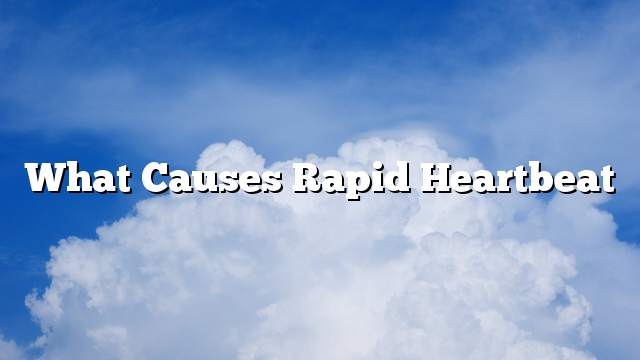Rapid heartbeat
One of the most important organs in the human body is the heart, its pulse and pulse are measured and timing harmonious, and may be exposed to this imbalance of harmony may accelerate heart rate may slow down depending on the factors affecting it.
Pulse acceleration is an irregular heart rate that is faster than the normal heart rate in the rest of the population, above 100 beats per minute. The heart of healthy adults usually beats from 60 to 100 times per minute when the person is in a relaxed state, In the upper chambers of the heart (the atria), the lower chambers of the heart (the ventricles), or both, where the heart rate is controlled by electrical signals sent through the heart tissue, when an abnormality in the heart produces fast electrical signals that move quickly within the muscle tissue My heart is up to date.
In some cases, heart rate acceleration may not cause any symptoms or complications, however, it can disrupt normal heart function, increase the risk of stroke, or cause cardiac arrest or sudden death. There are treatments that help control the speed of the heartbeat and treat diseases contributing to the acceleration of heart rate.
Causes of heart acceleration
Here are the factors, effects and reasons that lead to heart acceleration:
- Stress: This is where the brain reviews the current situation and stimulates the adrenal gland to secrete adrenaline or epinephrine as a reaction. Adrenaline increases blood pressure and increases heart rate (acceleration).
- Blood weakness: The weakness of the blood is caused by the lack of iron in it. Thus, the amount of oxygen in the blood decreases. The heart senses that there is a lack of oxygen supply to the cells, which doubles its work and effort to compensate for this deficiency and thus lead to accelerated heart rate.
- Reduction of Blood pressure: Here, blood circulation is weak and therefore insufficient blood supply to the different parts of the body and therefore not enough oxygen, nutrients and nutrients necessary for these parts, and this drives the heart to redouble its efforts to provide an appropriate amount of blood to these parts and thus accelerated heart rate.
- Heart problems itself: Such as heart enlargement (as a cause and result of acceleration), because the heart because of many factors as mentioned above multiplies its effort and with time begins to inflation as a result, and if exposed to inflation as a result of repeated infections it will accelerate to compensate for the lack of blood pumping such as doing physical work, even if simple, In blood vessels and high blood pressure.
- Excessive Physical Effort: As excessive physical exertion increases the body’s need for oxygen and thus increases the effort of the heart to pump blood to compensate for this deficiency.
- Chronic cough and allergies: The chronic cough and strong pressure on the muscles of the chest and the body needs oxygen and thus lead to the acceleration of the heart, and the sensitivity may cause the acceleration of the heart muscle; as the body becomes need oxygen because of the lack of self as an allergist and do an extra effort to compensate for this deficiency.
- Hyperthermia.
- Take some medicines or medicinal herbs.
- Alcoholism, and some types of drugs.
- Irregularity of salts and minerals in the body.
- Smoking.
- Hyperthyroidism.
Types of heart acceleration
There are several types of heart acceleration, and the most important major types:
- Atrial acceleration : The speed of the heart rate that begins in the upper chambers of the heart (atria), where electrical signals are generated in the upper chambers of the heart abnormally, which interfere with electrical signals coming from the node sinusoidal (SA) – the pacemaker of the heart – A series of early chimes of the atria begin to accelerate the heart rate in general.
- Pocket acceleration : It accelerates steadily, and may be due to increased pulse rate due to heat or tension and others, because the sinus node of the ears begin to generate electrical signals faster than usual, increasing the number of pulses but the heart beats correctly.
- Ventricular acceleration : The speed of the heart rate that begins in the lower heart chambers (ventricles), can be life threatening, requires rapid diagnosis and treatment, where the electrical signals in the ventricles start abnormally, which interfere with the electrical signals coming from the sinus node.
Symptoms of heart acceleration
Regardless of what type of heart rate the patient may have, he may experience several symptoms:
- Dizziness.
- Rotor.
- Shortness of breath.
- pain in chest.
- Feeling of heart palpitations.
- In severe cases it can become unconscious.
- Reduction of Blood pressure.
